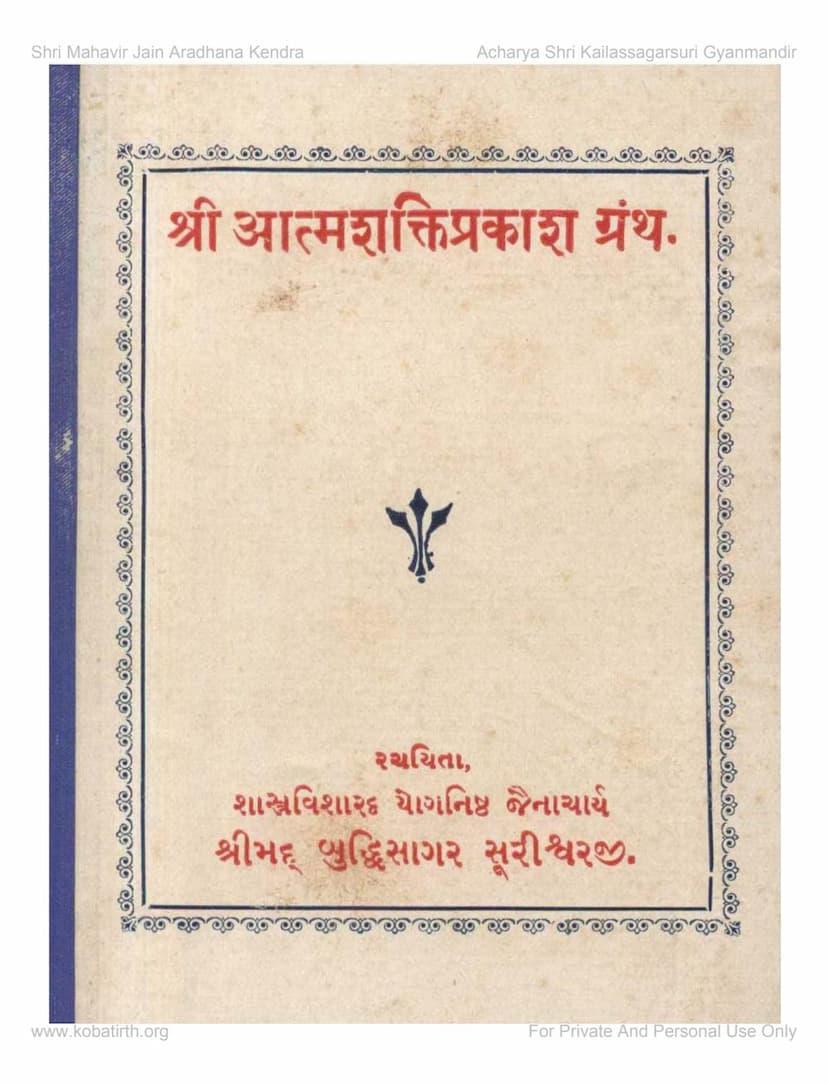Atmashakti Prakasha Granth
Added to library: September 1, 2025

Summary
This is a comprehensive summary of the Jain text "Atmashakti Prakasha Granth" by Acharya Shri Buddhisagar Surishwarji, based on the provided pages:
Title: Atmashakti Prakasha Granth (The Illumination of Soul Power) Author: Acharya Shri Buddhisagar Surishwarji Publisher: Adhyatma Gyan Prasarak Mandal First Edition: 1925 (Vikram Samvat 1981)
Overall Theme:
The book "Atmashakti Prakasha Granth" is a profound spiritual discourse focused on unveiling and activating the inherent, infinite power of the soul (Atman) within each individual. Authored by the highly learned and yogic Jain Acharya Buddhisagar Surishwarji, it aims to guide seekers towards self-realization, spiritual upliftment, and ultimately, liberation (Moksha). The text emphasizes the soul's true nature as powerful, blissful, and eternally free, currently veiled by karmic impurities and worldly attachments.
Key Concepts and Content:
The book is structured to progressively lead the reader from understanding the nature of the soul to practical methods for its realization. Here are the key themes and teachings discussed:
- The True Nature of the Soul: The book asserts that the soul is the repository of infinite knowledge, power, bliss, and purity. It is distinct from the physical body and the external world. The reader is encouraged to recognize this inherent, divine nature.
- The Problem of Ignorance and Attachment: The soul's true power is obscured due to ignorance (avidya) and the resulting attachment to worldly objects, desires, and negative emotions like anger, pride, deceit, and greed (kashayas). These attachments bind the soul to the cycle of birth and death (samsara).
- The Importance of Self-Reliance and Inner Strength: The central message is that true happiness and fulfillment are not found in external possessions or circumstances but within the soul itself. The book champions self-reliance and the activation of one's inner spiritual strength.
- Practices for Soul Realization: The text extensively details various spiritual practices to awaken and harness the soul's power:
- Meditation (Dhyana) and Concentration: Deep meditation, focusing the mind on the soul, and controlling the senses are highlighted as crucial for spiritual progress. Techniques like Trataka (gazing at a point) and focusing on specific internal chakras (like the navel, brow-center, etc.) are explained.
- Pranayama (Breath Control): The importance of proper breathing through the nostrils is emphasized for health and spiritual well-being. The text explains various Pranayama techniques to regulate vital energy (prana).
- Mind Control: The book provides guidance on mastering the restless mind, which is likened to a monkey or a wild elephant. It stresses the need for constant vigilance and redirection of thoughts towards the soul.
- Detachment (Vairagya): Cultivating detachment from worldly pleasures and attachments is presented as a necessary step to purify the mind and focus on the soul.
- Cultivating Positive Thoughts and Emotions: The text advocates for replacing negative thoughts and emotions with positive ones, such as love, compassion, forgiveness, and equanimity towards all living beings.
- The Role of a Guru: The importance of seeking guidance from a true spiritual teacher (Sadguru) is repeatedly stressed. A Guru is essential for understanding the subtle teachings and overcoming obstacles on the spiritual path.
- The Significance of the Navkar Mantra: The power of chanting the Navkar Mantra and reflecting on the virtues of the Pancha Paramashthi is mentioned.
- Understanding Karma and its Impact: The book touches upon the principles of karma, explaining how thoughts, words, and actions lead to the accumulation of merit (punya) and demerit (papa), which in turn shape one's experiences and destiny. It differentiates between different types of karma and their consequences.
- The Goal of Liberation (Moksha): The ultimate aim of these practices is to shed all karmic coverings, realize the soul's true, liberated nature, and attain Moksha, the state of infinite bliss and freedom.
- The Importance of Practice and Persistence: The author repeatedly emphasizes that spiritual realization is not achieved through mere intellectual understanding but through consistent practice, perseverance, and unwavering faith.
Specific Mentions and Anecdotes:
- Historical Context: The book was written during a period when spiritual teachings were being disseminated. The "Nivedan" (Preface) and "Prastavana" (Introduction) mention the efforts of the Adhyatma Gyan Prasarak Mandal and the financial support from Seth Vadilal Gulalji in memory of his wife Manekben, highlighting the community's contribution to spreading spiritual knowledge.
- Personal Accounts and Inspirations: The author shares his personal experiences and spiritual journey, including visits to Pethapur and the practice of meditation there, which inspired the writing of this book.
- Inclusion of Devotional Songs: The text includes devotional songs (Bhajans) and their interpretations by Acharya Anandghanji, further enriching the spiritual content.
- Emphasis on Jain Principles: While the teachings are universal, they are presented within the framework of Jain philosophy, emphasizing virtues like non-violence (ahimsa), truthfulness (satya), non-stealing (asteya), chastity (brahmacharya), and non-possession (aparigraha).
- The "Shuddhipatra" (Errata): A section for corrections indicates the meticulousness of the publication process.
- Catalog of Published Works: Pages 16-22 list a comprehensive catalog of other spiritual books published by the Mandal, showcasing a rich tradition of spiritual literature.
In essence, "Atmashakti Prakasha Granth" is a practical guide for spiritual seekers, offering profound insights into the nature of the soul and a roadmap for its realization through disciplined spiritual practices, ethical conduct, and devotion to a Guru, all within the Jain philosophical context.